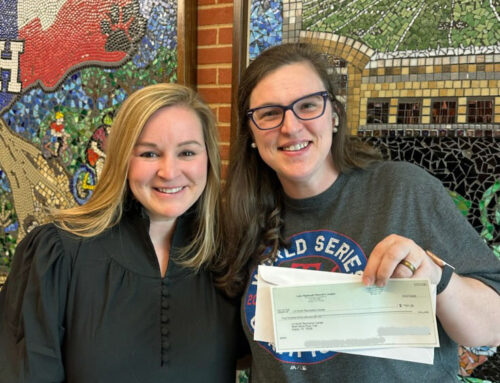While many look to shed pounds, Zemely Bryant’s daily goal is to gain weight.
In 1999, Bryant underwent a gastric bypass that went awry. During the operation, doctors clipped her colon, leaving the 70-year-old Bryant with severe digestive problems – problems that make eating challenging and putting on weight difficult.
Problems that, a year after the surgery, very nearly took her life.
Unable to keep on weight, Bryant was weakened and malnourished by a lack of nutrients and water. “I was completely dehydrated,” she says.
Still, she didn’t want to go back to the doctor. That is until Mary Breashear, her 74-year-old Senior Companion, intervened.
“She didn’t want to live,” Breashear says. “It pierced my heart that she was talking like that.”
So Breashear begged Bryant to seek medical attention, even breaking down in tears at one point. Bryant finally relented, but faced another hurdle at the hospital. There, doctors told her that unless she could prove to them she could walk, she would probably have to be placed in a nursing home.
With the little strength she had left, Bryant got up and walked.
“And Mary was right there with me,” she says. “I wouldn’t be here if it wasn’t for her.”
Bryant and Breashear’s friendship is a result of a program, started by the Senior Source of Greater Dallas program for those aged 60 and older. By being matched with Senior Companions, clients stay out of nursing homes. Between 10-40 hours a week, Breashear visits Bryant not only for in-home support, but also as a friend.
“If there are any papers to sign, I help,” Breashear says. “Otherwise, we sit and look at the TV and watch my soaps.”
Forty hours of training is required prior to placement. Recovery and loss, communication techniques and fall-risk prevention are a few support areas covered by program staff.
“Companions are not allowed to administer medication. They do everything else that is necessary for [those they’re matched with] to stay in their home as long as possible,” says Gretchen Finhals, program director.
While the program is mostly volunteer-based, low-income Companions may qualify for an hourly stipend, an additional assistance for qualified Senior Companions is offered by The Senior Source – things like meals, an annual physical, transportation allowances and accident insurance.
Senior Companions talk, listen and understand those they’re matched with on a peer level.
“It’s important for our clients to have someone their own age with them day in and day out,” Finhals says. “Family members might get frustrated wanting the client to eat better; having a Companion can encourage them to do something about their diet.”
In fact, companionship often turns into friendship, and the relationship becomes mutually beneficial. When Breashear began her companionship with Bryant in 1999, she had just lost her son to heart surgery.
“I, too, was battling depression,” she says, “but she could help me forget by helping her.
“It should be called the compassion program,” she adds.
For her part, Bryant is now well enough to enjoy her favorite pastime – fishing. She says all credit is due to Breashear, who keeps her fighting.
“She keeps encouraging,” she says, “and up I go.”





